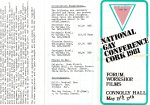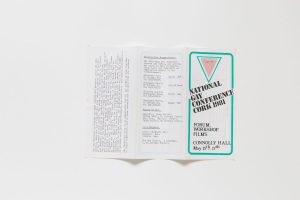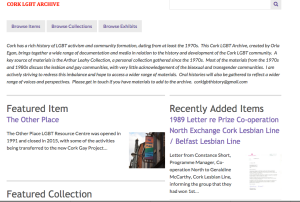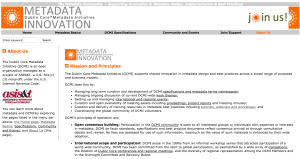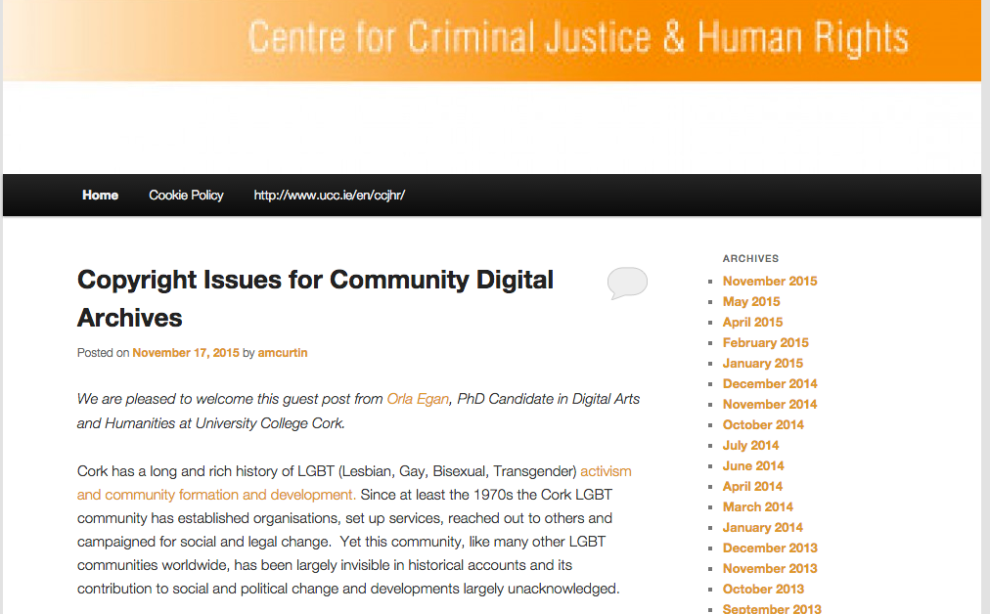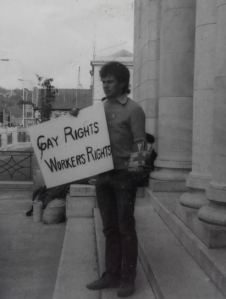
Laurie Steele Cork 1981
Up until the 1990s the rights of LGBT workers were not protected under Irish legislation. LGBT people frequently experienced prejudice and discrimination in their workplaces. Protecting the rights of LGBT workers and campaigning for legislative changes became a priority of the Irish LGBT organisations that began to emerge in the 1970s and 1980s. Cork LGBT activists played a central role in the campaign for LGTB workers’ rights and bringing about changes in the legislation.
One of the workshops at the National Gay Conference in Cork in 1981 was on Gays and the Trade Union Movement. 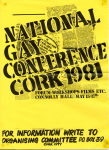 A number of motions were passed supporting the fight for equal employment rights for lesbians and gay men and calling for Trade Unions to support lesbian and gay rights. The Cork Gay Collective was to act as an information centre for all individuals working on issues of gay rights at work.
A number of motions were passed supporting the fight for equal employment rights for lesbians and gay men and calling for Trade Unions to support lesbian and gay rights. The Cork Gay Collective was to act as an information centre for all individuals working on issues of gay rights at work.
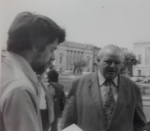
ICTU General Conference Cork City Hall 1981
Following the conference, members of the Cork Gay Collective lobbied and leafleted at the Irish Congress of Trade Union annual conference in Cork City Hall in 1981 urging them to support LGBT workers’ rights.
In 1982 Kieran Rose of Cork Gay Collective proposed a motion, seconded by Tricia Treacy, in support of gay rights at the Cork Branch of the LGPSU Trade Union (Local Government and Public Service Union). The motion was passed at the Cork Branch meeting and subsequently at the LGPSU Annual Delegates Meeting. The motion stated that the Union would call on the Irish Congress of Trade Unions to support repeal of the laws criminalising homosexuality and the amendment of employment legislation to prevent discrimination on the basis of sexual orientation. In 1982 the Irish Congress of Trade Unions (ICTU) passed a motion in support of gay rights. 
Support from trade union allies was important in progressing these motions. One such example is Cork trade union activist and President of the Cork Branch of LGPSU, Tom Bogue, who was a strong supporter of LGBT workers rights.
The Cork Bus Drivers Trade Union also provided support for LGBT colleagues and activists. Cork trade unionist and left-wing activist Michael O Sullivan recalls the support he and his colleagues provided during Cork Pride marches in the early 1980s – in full uniform the bus drivers positioned themselves along the route of the march and shouted out support to the LGBT people marching.
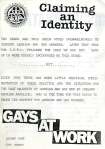 In 1984 Kieran Rose produced a leaflet, Claiming an Identity, Gays at Work, on behalf of the Cork Branch of LGPSU. The leaflet noted that while the unions had passed motions in support of gay rights, that there had been little practical progress in the implementation of these policies and that the situation of lesbian and gay men in Ireland remained appalling. The leaflet outlined the discrimination experienced by lesbians and gay men and called on the unions to renew their support for lesbian and gay workers.
In 1984 Kieran Rose produced a leaflet, Claiming an Identity, Gays at Work, on behalf of the Cork Branch of LGPSU. The leaflet noted that while the unions had passed motions in support of gay rights, that there had been little practical progress in the implementation of these policies and that the situation of lesbian and gay men in Ireland remained appalling. The leaflet outlined the discrimination experienced by lesbians and gay men and called on the unions to renew their support for lesbian and gay workers.
In 1985 gay activists met with Sylvia Meehan, the Head of the Irish Employment Equality Agency. Sylvia Meehan became a strong supporter of LGBT rights in the workplace. Commenting on the importance of this support Kieran Rose said that “supporting our demands, readily and unequivocally, was such a breakthrough for our campaign, and was such a brave decision by her.” In 1986 the Employment Equality Agency called for the inclusion of sexual orientation in Irish equality legislation.
Cork LGBT activists kept the pressure on trade unions to act to support LGBT workers rights and campaign for legislative change. In 1986 Donal Sheehan, Cork Gay Collective and Quay Co-op member, published an article on Discrimination Against Sexual Orientation in the Distributive Worker Newsletter (Official Organ of the Irish Distributive and Administrative Trade Union). The article addresses discrimination faced by LGBT people in the workplace and the role that trade unions can play in protecting LGBT workers’ rights.
Irish Trade Unions did respond to this lobbying to support the rights of LGBT workers and campaign for legislative changes. For example in 1986 the General Secretary of IDATU (Irish Distributive and Administrative Trade Union) wrote to the Minister of Labour requesting a change in the Employment Equality Act to include discrimination on the basis of sexual orientation. The Minister responded to say that he asked the Labour Department to consider incorporating such a provision.
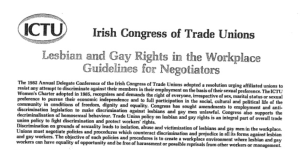 In 1987 ICTU published a very strong policy entitled “Lesbian and Gay Rights in the Workplace: Guidelines for Negotiators.” This document outlines the issues faced by lesbian and gay workers and the actions that unions can and should take to counteract discrimination against lesbian and gay workers.
In 1987 ICTU published a very strong policy entitled “Lesbian and Gay Rights in the Workplace: Guidelines for Negotiators.” This document outlines the issues faced by lesbian and gay workers and the actions that unions can and should take to counteract discrimination against lesbian and gay workers.
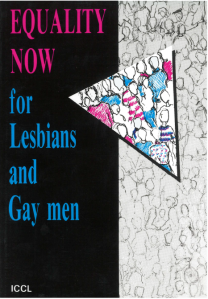 In June 1988, the Irish Council for Civil Liberties (ICCL) established a Working Party to explore the civil liberties policy in relation to lesbian and gay rights. In 1990 the ICCL produced its report on Equality for Lesbians and Gay Men. The report explored the prejudice experienced by lesbians and gay men in Irish society and legislation, and made the case for equality and law reform. It also provided a model for an Equality (Anti-Discrimination) Bill.
In June 1988, the Irish Council for Civil Liberties (ICCL) established a Working Party to explore the civil liberties policy in relation to lesbian and gay rights. In 1990 the ICCL produced its report on Equality for Lesbians and Gay Men. The report explored the prejudice experienced by lesbians and gay men in Irish society and legislation, and made the case for equality and law reform. It also provided a model for an Equality (Anti-Discrimination) Bill.
In 1988 GLEN (Gay and Lesbian Equality Network) was established, with Kieran Rose as a one of the founding members. Campaigning and lobbying for legislative change and equality for LGBT people was a central part of GLEN’s remit.
In 1990 the Irish Labour Party proposed an equality bill which included protection on the grounds of sexual orientation but it was defeated in the Dáil (Irish Parliament).
In 1993 Cork based lesbian Donna McAnallen was dismissed from her job as a lifeguard and fitness instructor in the Brookfield Leisure Centre in Cork, following allegations that she had been seen kissing her girlfriend in the changing rooms. In June 1993 Donna took a case to the Labour Court alleging that her dismissal constituted a contravention of the 1977 Employment Equality Act. The Labour Court judgement, delivered in 1994, found that she had been treated in an unfair and arbitrary manner but that this unfair treatment was not covered under the existing 1977 Employment Equality Act. This case strengthened the campaign to amend this legislation to include protection on the grounds of sexual orientation.
In 1993, following decades of campaigning, homosexuality was decriminalised in Ireland with the passing of the Criminal Law (Sexual Offences) Bill.
Also in 1993, following campaigning by GLEN and LGBT activists, the Unfair Dismissal Act was amended to include protection on the grounds of sexual orientation.
In 1995 the Combat Poverty Agency published a report on Poverty, Lesbians and Gay Men: the Economic and Social Effects of Discrimination. The report was based on research carried out by Nexus research group and GLEN (Gay and Lesbian Equality Network) and highlighted the impact of ongoing discrimination.
In 1998 sexual orientation was included as one of the protected grounds under the 1998 Employment Equality Act. Protection on the grounds of gender was also included. This change would not have happened without the years of active campaigning by LGBT activists for legislative protection for LGBT workers. The new legislation was an important step forward but it was not perfect. It included a clause which allowed for religious run institutions (e.g. schools and hospitals) to discriminate on the basis of religious ethos. (This clause was subsequently removed following campaigning by LGBT groups and allies).
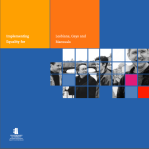 In 1999 the Irish Equality Authority established an Advisory Committee on Lesbian, Gay and Bisexual Issues (the focus was on the sexual orientation ground in the legislation; transgender rights were seen to be included under the gender ground). The Irish Equality Authority published its report Implementing Equality for Lesbians, Gays and Bisexuals in 2002. This report provided an agenda for action in addressing gay, lesbian and bisexual disadvantage in such areas as education, training, employment, services, health, support networks and community development. The report acknowledged the hostility, prejudice and systemic exclusions that are all too often the experience of lesbian, gay and bisexual people and made recommendations for change.
In 1999 the Irish Equality Authority established an Advisory Committee on Lesbian, Gay and Bisexual Issues (the focus was on the sexual orientation ground in the legislation; transgender rights were seen to be included under the gender ground). The Irish Equality Authority published its report Implementing Equality for Lesbians, Gays and Bisexuals in 2002. This report provided an agenda for action in addressing gay, lesbian and bisexual disadvantage in such areas as education, training, employment, services, health, support networks and community development. The report acknowledged the hostility, prejudice and systemic exclusions that are all too often the experience of lesbian, gay and bisexual people and made recommendations for change.
 TENI (Transgender Equality Network of Ireland) was initially set up in Cork in 2004 and then re-established in Dublin in 2006. TENI supports the trans community in Ireland and is dedicated to ending transphobia, including stigma, discrimination and inequality and continues in the struggle for social, political and legal recognition of trans people in Ireland. This includes supports for the employment rights of trans people.
TENI (Transgender Equality Network of Ireland) was initially set up in Cork in 2004 and then re-established in Dublin in 2006. TENI supports the trans community in Ireland and is dedicated to ending transphobia, including stigma, discrimination and inequality and continues in the struggle for social, political and legal recognition of trans people in Ireland. This includes supports for the employment rights of trans people.
TENI provided support to Louise Hannon when she took a case against her former employer, First Direct Logistics, to the Equality Tribunal in 2011. Louise Hannon claimed that the company had discriminated against her under the gender and disability grounds in the legislation. She had transitioned while employed in the company. Her employers accepted that she dress as a woman while in the office but insisted that she assume a male identity while meeting clients. The tribunal found that requesting Hannon to switch between male and female roles when she had chosen to be a female, was discriminatory.
In current employment equality legislation in Ireland discrimination against lesbians, gay men and bisexual people is prohibited under the sexual orientation ground and discrimination against transgender people is prohibited under the gender ground.








 An Irish woman and a Hungarian woman went to London…so begins this tale of Irish-Hungarian queer collaboration. In June 2016 Orla Egan,
An Irish woman and a Hungarian woman went to London…so begins this tale of Irish-Hungarian queer collaboration. In June 2016 Orla Egan, 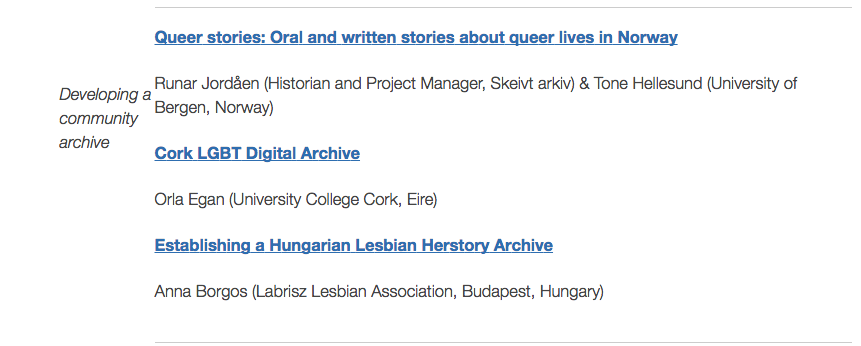
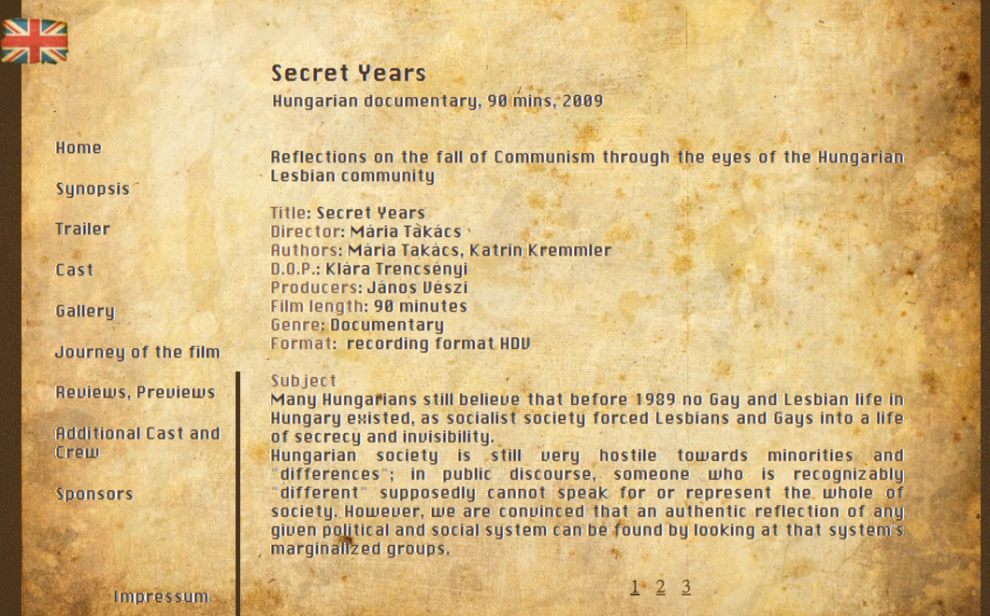
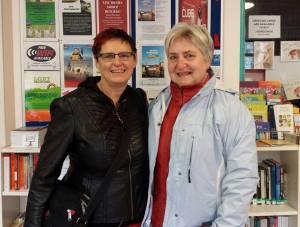
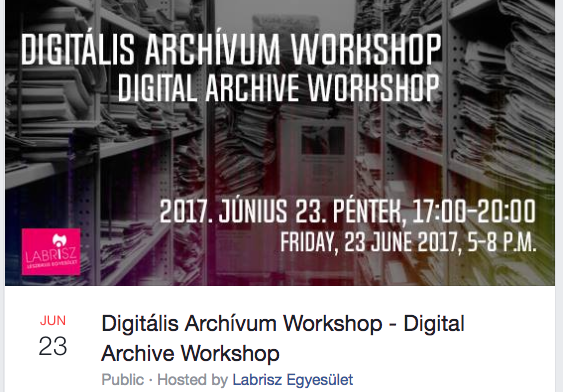
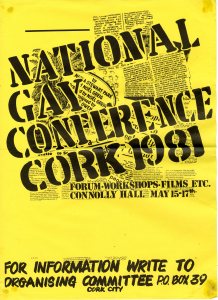
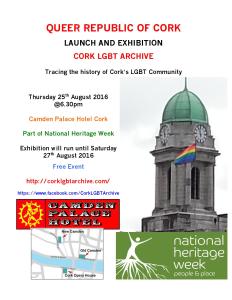 The
The 





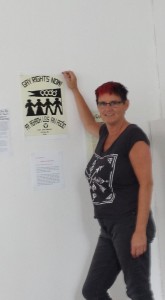
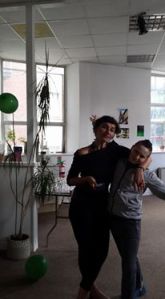

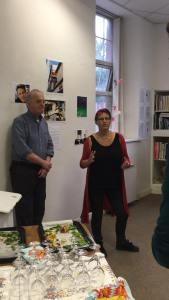
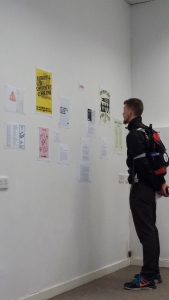
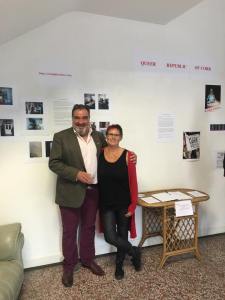

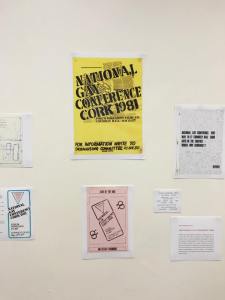
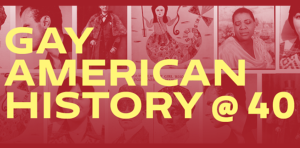 It was like my bookshelf came to life! The Gay American History @ 40 conference in New York in May 2016 gave me a unique opportunity to meet with and engage with my ‘heroes’, the LGBT scholars whose pioneering work has inspired and stimulated my own work.
It was like my bookshelf came to life! The Gay American History @ 40 conference in New York in May 2016 gave me a unique opportunity to meet with and engage with my ‘heroes’, the LGBT scholars whose pioneering work has inspired and stimulated my own work.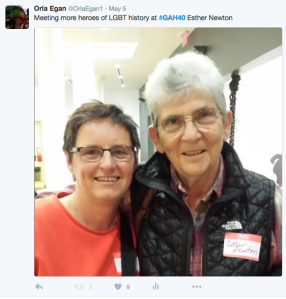 of John D’Emilio, Jonathan Ned Katz, Esther Newton and the many other LGBT historians who gathered together at this conference – their scholarship and activism has motivated me to want to work on documenting, analysing and sharing the rich history of the Cork LGBT community. At the early stages of my own work on the Cork LGBT Archive, John D’Emilio had taken the time to engage in email discussions with me, providing invaluable advice and encouragement. It was a pleasure then to be able to meet him at the conference, to be able to meet and engage with my ‘heroes’ and to be present for a stimulating, and at times heated, discussion on the current state of LGBT history.
of John D’Emilio, Jonathan Ned Katz, Esther Newton and the many other LGBT historians who gathered together at this conference – their scholarship and activism has motivated me to want to work on documenting, analysing and sharing the rich history of the Cork LGBT community. At the early stages of my own work on the Cork LGBT Archive, John D’Emilio had taken the time to engage in email discussions with me, providing invaluable advice and encouragement. It was a pleasure then to be able to meet him at the conference, to be able to meet and engage with my ‘heroes’ and to be present for a stimulating, and at times heated, discussion on the current state of LGBT history.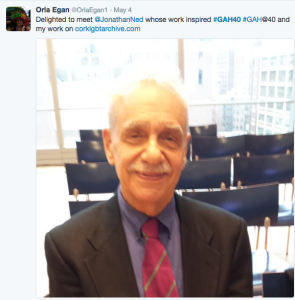 Gay American History @ 40 was a combination conference, a reunion of academic / activist comrades and a tribute to the inspirational work of
Gay American History @ 40 was a combination conference, a reunion of academic / activist comrades and a tribute to the inspirational work of 



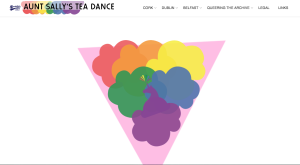 engaged with the materials found in the various archives. It is a fresh and dynamic perspective on LGBT history. “
engaged with the materials found in the various archives. It is a fresh and dynamic perspective on LGBT history. “ Last night I attended the launch of the website at the new
Last night I attended the launch of the website at the new 